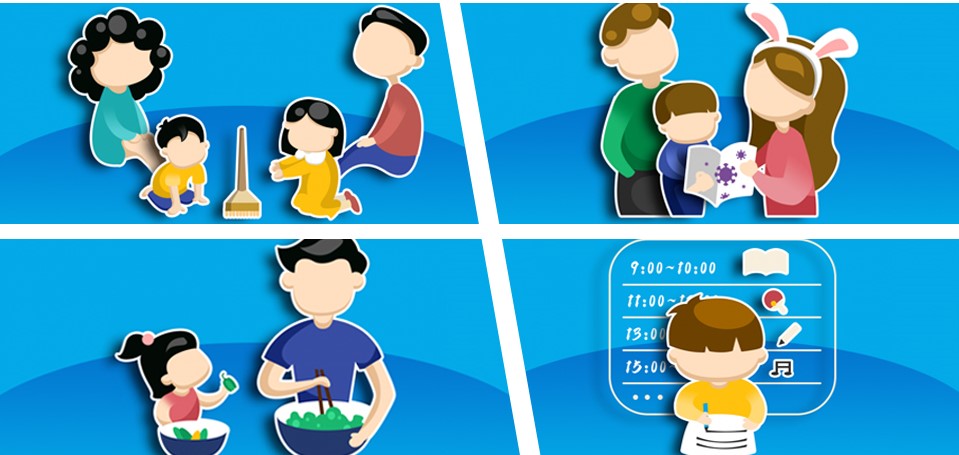Date: 27 April 2020
Time: 4 – 5 PM
Facilitated by: Mrs. V. Chitraleka and Dr. V.Surendran
Introduction
The outbreak of COVID-19 is an unprecendeted situation that the world has been going through. Different countries have taken various measures to contain the spread of the virus. Like many other countries, India has employed the use of lockdown as a response to tackle this novel situation. A lockdown helps in preventing the spread of the coronavirus as well as protecting ourselves from coming into contact with or transmitting the deadly virus. However, this lockdown has put each of us in a very unique situation where our movement is restricted, and we are placed in the company of only the people we live with. This restriction of movement and activity tends to affect people psychologically. Unfortunately, these issues are generally neglected or not at all detected by others or even by the family members, as these issues may arise due to many factors which we may or may not be able to notice. The real question then is “How to identify and address these factors?”. This topic was taken up for discussion with teachers, and the session was conducted in two parts:
- The first session addresed the pscychological issues faced by individuals of different age groups—children, women, adults, and aged persons. This session also addressed specific issues raised by the participants.
- The second session took to discuss what immediate safety measures are to be taken in case of any medical emergencies while in lockdown.
To facilitate these sessions, two experts were called in:
- Mrs. V. Chitraleka (Retd. Social Service Officer, Dept. of Pscychiatry, JIPMER), who talked about the pscychological issues faced and their remedies.
- Dr. V. Surendran (Assistant Professor, Mahatma Gandhi Medical Hospital), who addressed the topic of safety measures and cases of medical emergencies.
Expert Opinion
Staying at home does not necessarily make a person happy at all times. Human beings require social interactions to stay healthy and happy. We all have some issues on accepting our present situation of being immobilised at home which we fail to acknowledge from the outside, but which makes us feel uncomfortable within. These feelings may differ among people of different ages. Since all of us functioned differently before this period of lockdown, it may feel inconvenient to be forced to stay at home all of a sudden. The difficulties faced will vary for people of different age groups and even between gender. The possible psychological stress and anxiety faced due to lockdown by individuals of different age groups will be discussed as follows.
Young Children: Children may take this situation lightly. They might suddenly find that the adults have more time to spend or play with them. However, adults may be stressed out due to the changing situaions and may not always be ready to give attention to the children. Kids could also play tantrums since they will not be allowed to step outside their homes. Adults need to be more patient in these situations. It is advised that children are not scolded unnecessarily as the kids will be observing how adults are behaving. Children should be provided with adequate space to play games. Adults will also have to teach kids about self-hygiene, and the proper way to maintain hygiene needs to be shown to the kids as well. Adults need to spend time with their children, play with them, and even talk about COVID-19 and how we should be careful about the same.
Adolescents: Dealing with people of this age group is quite difficult yet crucial. People of this age group will be going through physical and psychological changes, and it will be stressful for them. Adolescent boys and girls would want to go out, meet their friends, and do other such things. It is possible that they could get hooked to their mobile phones. This will affect their sleep—either they will oversleep or they will sleep less. Adults should spend time and talk to them to know what they are going through. It is good to keep observing the behaviors of young children. Parents should reach out to adolescents with empathy and care, provide them a supporting hand, and be like a friend to them.
Women/Mothers: Women will be facing a lot of stress under these circumstances. There will be a lot of household chores that they have to take care of. There would be a lot of demands from the children, the aged parents, and even the husband while at home. Cooking, child-care, taking care of the elderly, cleaning the house, and various other chores would take up a lot of their time and may render them physically and mentally exhausted. There may be instances of sexual abuse and tantrums thrown by alcoholic husbands that mothers will have to face now. Family members need to talk often, share the work at home, and support each other in order to relieve the stress of the mothers in the household. Mothers need to be able to find time to spend doing activities that they like.
Elderly People: The newspapers are filled with reports of the aged being more vulnerable to the coronavirus and mortality rate being high among the old-aged people. Such news is sure to create anxiety and stress in the elderly. They might also be anxious about their routine medications; they can be worried that their medicines would run out and that they will be unable to buy it again. They could forget to take their medicines or skip dosages to save tablets. Others in the family need to reassure the elderly and make them feel better. In the time of this pandemic, one may feel that the elderly can be a bit irritating, but it is advised to endure the little things and work for their well-being.
General Precautions for Everyone
- Maintain physical hygiene by frequently washing your hands and legs.

- Stay connected with people but maintain physical distancing; avoid going to crowded places.
- Avoid unnecessary travelling even after the lockdown period is over; this virus will continue to pose a problem unless a vaccine is ready.
- Be mentally prepared to fight against COVID-19 and do not panic.
Each individual will have to be mentally strong and engage themselves actively for the well-being of their family members.
Question and Answer Session
Q. 1: Can vaccinations of newborn babies be delayed?
Ans: Babies will have less immunity; hence, it is very important to have them vaccinated as per the schedule. Vaccination is available in the nearest Primary Health Centre (PHC), which is open on Tuesday and Wednesday in Pondicherry. It is good to visit the PHC and get an appointment before one takes the baby to the centre. It is also important to reduce the contact of babies with people other than their immediate family members.
Q. 2: How to reduce technology addiction among adolescent children?
Ans: We can do this in many creative ways, such as by giving tasks to them. They can be made to do the household chores, or made to learn to work from home and follow it regularly, and so on. They should be motivated through appreciation and encouragement when they finish the work they are asked to do.
Q. 3: My husband stays abroad. I feel quite sad, and I am pregnant. I sometimes feel that I am left alone with no support. What should I do now? Will he be required to be quarantined once he reaches India even if he tests negative for COVID-19?
Ans: Yes. Your husband may have to be quarantined for at least 14 days once he reaches India. This is an important precautionary measure to avoid the spread of this disease, since there have been cases of people having the coronavirus despite being asymptomatic. You will have to stay strong and be happy. There are robust systems in place to help people travelling in from abroad.
Q. 4: How can we prevent newborn babies from this threat?
Ans: With regard to newborn babies, one has to be more cautious about who are allowed to be near them. In the first 5 to 6 months, s/he has to be only with the mother, and perhaps the father can be in contact with the baby too. But, it must be made sure that both the parents must maintain good hygiene and take every precautionary measure. During this crisis, we can avoid allowing the baby to be in contact with anyone other than the parents. This can be uncomfortable sometimes, as relatives and other friends may want to see their newborn one. However, as parents, it is better to postpone such engagements for the time being.
Q. 5: One of my family members takes homoeopathy medicines for hypertension. His medicines are over now. Will it be alright for him to switch to allopathic medicines now and get tablets from a medical store, since visiting a doctor is not possible?
Ans: Many generic medicines are brought over the counter (from pharmacies) which is not advisable. Government health machineries are still in operation. It is better to visit a doctor regarding medications and change of treatment system. Shifting from homoeopathy to allopathy will not be a threat, but it is advisable to get in touch with a doctor to decide about this.
Note from Doctor: If people feel that something is wrong and that they needed to be tested, they can reach out to the nearest government healthcare center or hospital for a checkup. There, they will be provided with the initial level test and support that are required.
Term: Term 3
- Log in or register to post comments